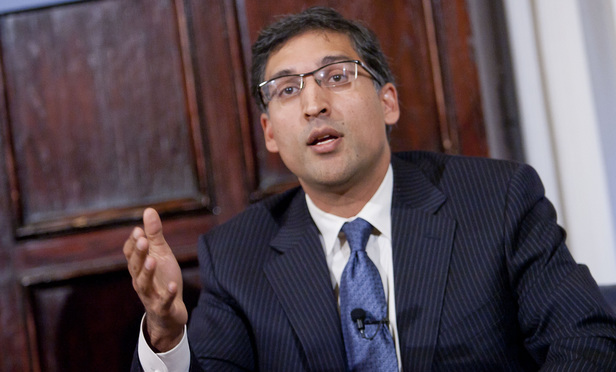The video (see below), obtained Monday by The NLJ, shows Katyal stating that “we in the solicitor general’s office have made mistakes” in presenting Indian cases to the Supreme Court.
In the Sandoval case, he said, the solicitor general told the court that Indians’ susceptibility to alcohol is “a racial, not a political fact.” The government brief in the Tee-Hit-Ton case spoke of “the savage character of the native inhabitants.” By using such language, Katyal said, the office “has not always played an optimal role in the development of Indian law,” a fact that demonstrates “we must never cross the line into prejudice and racism.”
“Tee-Hit-Ton was probably the worst case in the 20th century” for Native American tribes, said Matthew Fletcher, a professor at Michigan State University College of Law, and director of its indigenous law center. Fletcher solicited Katyal’s speech for the 2011 event. There, and at most other Indian law conferences, discussion often turns to the Supreme Court’s “terrible record in Indian tribal matters,” Fletcher said.
“I was pretty surprised when I heard Katyal’s talk,” Fletcher recalled. “It was very much an apology. He talked about misrepresentations to the court, and he said the U.S. had a trust relationship with tribes that comes into conflict with the department’s litigation positions.”
Katyal, who left the solicitor general’s office in August 2011 for Hogan Lovells, where he is now a partner, did not immediately comment on the lawsuit when reached on Monday. A Justice Department spokeswoman said the agency was reviewing the complaint.
The California Indian law group first sought documents about Katyal’s speech—including its text—in 2011 under the Freedom of Information Act. In April 2012, the Office of the Solicitor General (OSG) released 78 pages, 34 of which were completely redacted, according to the lawsuit.
The solicitor general’s office invoked exemptions that allow government agencies not to release documents that were an attorney’s work product, were part of a deliberative process, concerned personnel rules or would invade personal privacy.
Administrative appeals failed to unearth more documents, leading the association to file the FOIA lawsuit. The association is affiliated with the Hoopa Valley Tribe.
“We should know how this decision was made,” Grove said. Katyal’s confession of error, he said, is “likely to have significant implications for other cases,” but because of the dearth of documentation, its impact has not yet been felt.
A confession of error could weaken the precedential value of a case. Both decisions mentioned by Katyal have been cited hundreds of times in other federal court rulings.
Katyal’s talk before the Indian law conference came about a month before his more widely publicized confession of error over alleged misrepresentations the solicitor general’s office made in the World War II Japanese internment cases decided by the Supreme Court.
That apology came in form of a post at the U.S. Justice Department blog.
This story was updated at 7:24 p.m. EST with additional information from Katyal’s videotaped remarks in 2011. In the video below, the apology begins at about the 55-second mark.




